Tag : interview
May 2, 2019 by Yona Zeldis McDonough
The Object of Your Affections: What’s a Baby Between Friends?
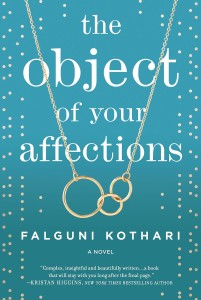
Two best friends undergo a bitter falling out and a tearful coming back together. But this is no ordinary rapprochement—because one of the women asks her friend to be the surrogate who carries her child. Author Falguni Kothari talks to Lilith’s fiction Editor Yona Zeldis McDonough about the complex, delicate nature of such a relationship, and how it set the plot for her new novel in motion.
- No Comments
April 25, 2019 by Eleanor J. Bader
Revisiting the Turmoil of the Late 60s, In Fiction
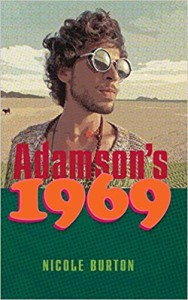 Nicole Burton’s sweeping first novel, Adamson’s 1969, (Apippa Publishing Company) tells the story of Henry Adamson, a young British immigrant to the U.S. whose arrival coincides with some of the most dramatic political movements and events of the late twentieth century.
Nicole Burton’s sweeping first novel, Adamson’s 1969, (Apippa Publishing Company) tells the story of Henry Adamson, a young British immigrant to the U.S. whose arrival coincides with some of the most dramatic political movements and events of the late twentieth century.
It’s 1969, the year of Woodstock, numerous massive anti-war protests, multiple plane hijackings and growing pushback against repressive gender norms. And Adamson—he prefers to be addressed solely by his surname—pays attention to each unfolding event as he is trying to finish high school and figure out the college application process, all of it done without parental counsel.
- 1 Comment
April 22, 2019 by Yona Zeldis McDonough
A Novel Bends Time at the Onset of the Holocaust
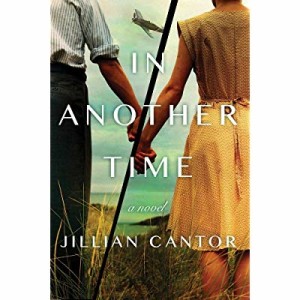
A talented young female musician, the bookselling man who loves her and a quasi-magical way to escape the rising Nazi horror in Germany are the key elements in Jillian Cantor’s latest novel, In Another Time.
Below she chats with Fiction Editor Yona Zeldis McDonough about how she crafted this original and compelling story that asks whether it’s really possible to escape the horrors of history.
- 1 Comment
April 17, 2019 by Yona Zeldis McDonough
Golden Girls of the Silver Screen
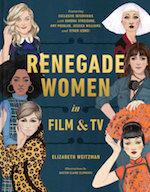
Well told and illustrated with charm, Renegade Women is a coffee table book for our feminist pop cultural age. It offers more than 60 informative and whimsically illustrated portraits of female movers and shakers in the entertainment field.
Fiction Editor Yona Zeldis McDonough chats with author Elizabeth Weitzman about the importance of highlighting their impressive accomplishments.
- No Comments
April 17, 2019 by Yona Zeldis McDonough
The Story of a Storyteller
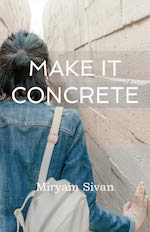
Longtime Lilith readers may remember Miryam Sivan’s name; her story Roadkill appeared in the magazine in 2003 and City of Refuge was featured in 2011.
Now she’s back with her debut novel, Make It Concrete, which is set in contemporary Israel and follows a woman who transcribes Holocaust stories. Sivan talks to fiction editor Yona Zeldis McDonough about how the past shapes and even defines the present.
- No Comments
April 11, 2019 by Yona Zeldis McDonough
A Novel Invents a Musical Masterpiece
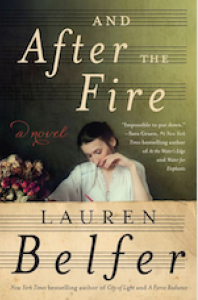
Lauren Belfer’s And After the Fire, is a complex, highly textured novel that moves easily between past and present to tell the converging stories of musicians and those in their orbits, centering around one imagined musical masterpiece through the centuries.
Winner of the National Jewish Book Award, Belfer talks to Lilith’s Fiction Editor Yona Zeldis McDonough about the inner melody that led to this highly original and haunting story.
Yona Zeldis McDonough: What inspired you to write about a fictional piece of music?
- 1 Comment
April 9, 2019 by Yona Zeldis McDonough
A Jewish Beauty’s Journey, in Fiction

Entertaining and witty, Susan Dworkin’s novel, The Garden Lady—chronicling a woman of notable beauty—nonetheless asks some penetrating questions about the lies we tell ourselves in order to keep going.
Fiction Editor Yona Zeldis McDonough talks to Dworkin, a feminist who worked at Ms. in its early days, about what Gloria Steinem called her “new dreams of justice” and how she’s pursued them both in this novel and elsewhere.
- No Comments
April 2, 2019 by admin
Are You a Woman Who Survived Concentration Camp? Or Her Daughter or Granddaughter?
We are eager to document the forced administration to women of substances that led to the cessation of their menstruation and, for some, infertility and miscarriages afterward.
In the years after the Shoah, the common and understandable medical assumption was that the cessation of menstruation in the camps was the result of malnutrition. But there is now data to refute this: both the emaciated women arriving to Auschwitz in 1944 from Poland’s ghettos and the women arriving in 1944 from Hungary, where they were not starved, all stopped menstruating immediately after arrival, regardless of differences in body mass.
Some women reportedly received injections, others were forced to ingest food or liquids which contained a similar substance. In both cases the women ceased menstruating—some for months, some for years; some suffered miscarriages or were left permanently infertile. Self-reports suggest that the younger the adolescent girl at the time she arrived in the concentration camps, the greater the long-term impact upon her future reproduction.
These interventions were conducted so routinely that this history has been unspoken and its connection to long-term effects unrecognized. Interviews with survivors indicate that they were part of the “processing” of those new female arrivals at Auschwitz (and perhaps other death camps) who were not killed immediately. Women survivors’ experience related to their subsequent fertility may also have received limited investigation because of the sensitive and taboo subject. Survivors themselves may have been reluctant to raise the issue, and earlier interviewers may not have thought to—or had the training to—ask questions that would elicit such material.
To uncover these missing stories, one of my colleagues and I are seeking to interview female concentration camp survivors and any children of survivors whose mothers may have shared with them stories about their post-Holocaust fertility challenges. While there is no cohesive, documented narrative of this particular experience, stories exist vividly in the memories of survivors who still do not know what exactly was done to them or why. We are attempting to assemble the fragments of this unknown chapter of the Shoah and to hear from women and their children. We can conduct interviews in Yiddish, English, Hebrew or French. Not only do these women’s stories deserve to be given voice, but also there may be important medical consequences for the second and third generation.
To be interviewed, contact Peggy J. Kleinplatz, Ph.D. at 613-563-0846 or Paul J. Weindling, Ph.D. at pjweindling@menbrookes.ac.uk.
- No Comments
March 27, 2019 by Eleanor J. Bader
Standing Up for Immigrant Families, One Case at a Time
When New York Law School professor Lenni B. Benson created the Safe Passage Project in 2006, she did not anticipate that the number of unaccompanied minors trying to find asylum in the United States would skyrocket, going from 16,067 in 2011 to 41,456 in 2017.
But it has, causing tens of thousands of children to be taken into federal facilities where they will face formal removal proceeding that require them to appear before a judge and explain why they left home.
- No Comments
March 22, 2019 by Yona Zeldis McDonough
A Breathtaking Novel Set on the Eve of World War I
 Set in the years before and just leading into World War I, House of Gold is a vast, enthralling tapestry of a novel. The story moves seamlessly from character to character and place to place, all the while picking up speed and momentum as the war looms ever closer.
Set in the years before and just leading into World War I, House of Gold is a vast, enthralling tapestry of a novel. The story moves seamlessly from character to character and place to place, all the while picking up speed and momentum as the war looms ever closer.
Fiction Editor Yona Zeldis McDonough chats with author Natasha Solomons to ask her about what drew her to the subject and what she learned along the way.
- No Comments
 Please wait...
Please wait...